|
HEADLINER
Toyota Kirloskar
FOR A COMPANY THAT'S
been in India for less than a decade, Toyoto Kirloskar Motor Company
Ltd (TKML) has had more than its fair share of labour trouble.
Its workers struck work in 2001, 2002, 2005 and, now, last fortnight.
The trigger this time around was the management's decision to
dismiss three employees on January 4, following an investigation
into their alleged misconduct in 2004. The CITU-affiliated TKM
Employees Union, to which 1,400 of TKML's 2,350 employees belong,
promptly called for a strike. "These three employees were dismissed
after a year-long enquiry found conclusive proof of their wrongdoing,"
A.R. Shankar, TKML's General Manager (Corporate Planning) told
BT. The lockout is indefinite and if not reviewed, could hurt
Toyota's sales. "The management (seems) confident that the 6,000
vehicles in the yard will last it a while before any supply crunch
happens," S.R. Deepak, General Secretary of the union, told BT.
Toyota's Bidadi plant near Bangalore rolls out 200 vehicles a
day, including Innova and Corolla.
-Venkatesha
Babu
Will Kampani Do A Kothari?
 |
| JM Fin.'s Kampani: Reason to smile |
After DSP Merrill Lynch's Hemendra Kothari,
it may be JM Morgan Stanley's Nimesh Kampani who sells out to
his foreign partner. When BT went to press, there were reports-denied
by Kampani-of Morgan Stanley planning to buy out the local partner
from the listed holding company JM Financial, where the Kampanis
own about 69 per cent. Morgan Stanley already owns 49 per cent
in JM Morgan Stanley Securities and 51 per cent in JM Morgan Stanley
(I-banking business). If a deal does happen, Morgan Stanley-it
is being said-will end up with control of the partnership's institutional
equity broking, I-banking and NBFC business, while Kampani-who
could make Rs 600 crore in the process-gets retail broking and
asset management.
Tata Tele Scouts For A Partner
The buzz on deal street is that CDMA operator Tata
Teleservices is planning to sell a 10 per cent stake in itself
to a financial investor. Tata Tele executives wouldn't confirm
or deny it, but one of the investors being talked to is Singapore's
private equity giant, Temasek. Tata Tele operates in 20 circles
and at last count had 7.1 million subscribers.
 |
| UB's Mallya: A change of heart |
Mallya Saya No To Air Sahara
Until recently, UB group's Vijay Mallya was said
to be the front-runner for acquiring Air Sahara, but now he's
had a change of heart. Last fortnight, Mallya announced in Mumbai
that he was no longer considering buying Air Sahara, and instead
his Kingfisher Airline would look at growing organically. For
instance, the airline plans to start first-class service from
April this year.
NEWSMAKERS
Anil Ambani
 |
| Reliance Infocomm's Ambani:
Riding high, riding low |
It has been a
mixed bag of a new year for reliance Infocomm and its high-profile
chairman Anil Ambani. The good news is that the telco became the
first in the country to buy into Communications Minister Dayanidhi
Maran's vision of 'IndiaOne', a single tariff for any telephone
call made from Point A to Point B within the country, irrespective
of the distance between the two. Reliance Infocomm has picked
Re 1 as the single tariff, which is only in keeping with the IndiaOne
concept. The buzz in the capital's telecom circles is that Anil
shares a better relationship with Maran than his brother Mukesh
(who ran Infocomm until a June settlement that saw its ownership
pass to Anil) did. Significantly, India's telcos that use the
GSM platform (think Bharti, Hutch, and other companies that are
part of the Cellular Operators Association of India, COAI, and
were perceived to be the stronger lobby (than rivals such as Reliance
that use the CDMA platform) in the government of the day's dispensation,
are yet to do anything about IndiaOne. Reliance Infocomm's initiative
could well see it retain pole position in India's mobile telephony
market. The bad news took the form of the involvement of some
of the company's executives in the tapping of Samajwadi Party
leader Amar Singh's phone and the Supreme Court's directive to
the Central Bureau of Investigation, the Union Government, and
the Central Vigilance Commission to look into an allegation that
Reliance Infocomm shares were issued at a significant discount
to some companies associated with former Communications Minister
Pramod Mahajan (the court was responding to a Public Interest
Litigation filed by an NGO). Both episodes date to a time when
Anil was not in charge of the company. Still, it is his company
now and is in the news for all the wrong reasons.
-Krishna Gopalan
NUMBERS
OF NOTE
40%:
The contribution of Bangalore to India's IT revenues. The city
is home to nearly 1,500 tech companies and some 200,000 workers
$138.5 billion
(Rs 6,23,250 crore): Total funds raised by 268 IPOs in the
world capital markets between January and November 2005. The figure
is $14.5 billion (Rs 65,250 crore) more than what was raised in
all of 2004
Rs 9,990 crore:
Total funds raised by 53 IPOs in the Indian capital market in
2005. Rs 13,121 crore was raised by 25 issues in 2004
500,000:
Shortage of IT workers in India by 2010, according to a report
by McKinsey and Nasscom
440,000:
The number of online transactions (business to consumer) in India.
By March 2007, that number will increase to 790,000
16%: The
growth registered by Dubai's economy in 2005. The Chinese economy
grew by 8.5 per cent in the same period, and India's will grow
by 7.5 per cent in 2005-06
750: The number
of technology specialists the US produces for every 1 million
of its population. The corresponding numbers for China and India
are 500 and 200, respectively
17 million:
The expected rise in the number of unemployed urban Chinese in
2006
50,000:
The number of employees India's top three IT services companies,
Wipro, TCS and Infosys, plan to hire over the next 12 months
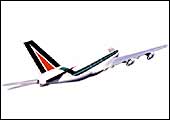 Rs
1,374 crore: The amount 56 private telecom companies
owe the government as licence fee dues Rs
1,374 crore: The amount 56 private telecom companies
owe the government as licence fee dues
30,000 euros
($35,750 or Rs 16,08,750): The fine imposed by Italy's antitrust
agency on Alitalia for misleading consumers by advertising a return
flight tariff, but showing only the price of a one-way ticket
Fourth
Time Unlucky?
Blame it on fears
that a terrorist outfit might use the opportunity to its advantage
and launch an attack, or infrastructure (the absence of an international
airport, for instance), but the fourth annual Pravasi Bharatiya
Divas (an event for the extended Indian diaspora) at Hyderabad
was not as big an event as its three previous editions (the first
two were held in Delhi and the third in Mumbai). Still, some 1,000
'Indians' attended; the chief ministers of six states, including
Bihar's new man-on-top Nitish Kumar, pitched their wares to potential
investors; and Prime Minister Manmohan Singh issued the first
Overseas Citizenship of India cards.
-E. Kumar Sharma
NOTED
 CLOSED:
By ChrysCapital, its fourth fund, with a corpus of $550
million (Rs 2,475 crore). With this, the total funds under management
of the company co-founded by CEO Ashish Dhawan reaches $1 billion
(Rs 4,500 crore), making it the largest India-focussed entrepreneurial
venture capital fund. CLOSED:
By ChrysCapital, its fourth fund, with a corpus of $550
million (Rs 2,475 crore). With this, the total funds under management
of the company co-founded by CEO Ashish Dhawan reaches $1 billion
(Rs 4,500 crore), making it the largest India-focussed entrepreneurial
venture capital fund.
ACQUIRED: By
Temasek Holdings, Dove Finance, a Chennai-based non-banking finance
company, thereby rendering redundant the need to seek approval
of the Reserve Bank of India to set up a financial services firm,
a process that could take time.
ADDED: By India's
telcos, a record 4.5 million to 5 million new connections in the
month of December, almost double the usual number. State-owned
Bharat Sanchar Nigam Limited and the Anil Ambani-controlled Reliance
Infocomm both claim to have added over 1 million connections.
CONTENDED: By Rani Chhabria, mother
of the late Manu Chhabria, that she has a share in the estate
of the latter, a claim that has been rubbished by his wife and
the Jumbo Group's Chairperson Vidya Chhabria.
REGISTERED: By
New Delhi, a temperature of 0.2 degrees Celsius, on the morning
of Sunday, January 8. This was the lowest temperature recorded
in the city in 70 years.
 ISSUED:
To Nivruti Rai, Senior Manager, Chipset Group, Intel India,
US citizen, Indian American and mother of two, the first Overseas
Citizenship of India (OCI) card, by Prime Minister Manmohan Singh
at the recent Pravasi Bharatiya Divas in Hyderabad. The second
card was issued to Iftekhar Shareef. ISSUED:
To Nivruti Rai, Senior Manager, Chipset Group, Intel India,
US citizen, Indian American and mother of two, the first Overseas
Citizenship of India (OCI) card, by Prime Minister Manmohan Singh
at the recent Pravasi Bharatiya Divas in Hyderabad. The second
card was issued to Iftekhar Shareef.
SOUGHT: (As this
magazine goes to press), by Taj Television, owner of the Ten Sports
channel, a stay of government rules making it mandatory for it
to share the feed for the Indo-Pak cricket series with national
broadcaster Prasar Bharti, from the Supreme Court.
So
long, UTI-I
 |
| UTI's Mathur: Overseeing
the requiem |
Three months from now,
UTI-I will cease to exist. In late 2002, the government decided
to break India's largest fund into UTI-I, which would take over
US-64, the assured returns schemes and SUS-99, a scheme introduced
to bail out US-64 in 1999, and UTI-II, which would be a asset
management company that would manage all the other NAV-based funds
(the two were created in February 2003). There's still the matter
of some Rs 8,000 crore worth of equity, which the government doesn't
want UTI-I to sell for reasons that vary from fears of a hostile
acquisition (in case the fund were to sell its stake in ITC) to
unclear policy (in the case of UTI Bank). Another headache is
the divestment of UTI-I's shareholding in unlisted entities such
as NSE, NSDL, ICRA, IL&FS and ARSEC India, though talks are
in advanced stages for selling UTI Securities and IL&FS. "This
is one area where major efforts are required," admits S.B.
Mathur, the administrator of UTI-I. The good news: given current
valuations, the government will have some money left over after
UTI-I meets all its obligations.
-Anand Adhikari
26
Predictions For 2006
 A:
AUTOMOBILES A:
AUTOMOBILES
How many passenger cars will be sold?
Around 1.25 million (including
utility vehicles), if all goes well, and the economy continues
to remain buoyant. Last year, 2005, was the first calendar year
when automobile sales crossed the 1 million mark. This, despite
misconceptions over vat, and floods in western and southern India.
-Kushan Mitra
B: BUDGET
2006
How will it look?
The controversial fringe benefit
tax will undergo a complete makeover. However, there is little
chance that direct and indirect taxes will be lowered given the
government's compulsions to balance its books. That will also
see more services being brought under the tax net and several
industry-specific exemptions being withdrawn.
-Ashish Gupta
C: CITIES
Will the National Urban Renewal Mission help?
 Well,
it has Rs 1,00,000 crore (or will eventually have that amount)
to splurge on 60 cities with populations in excess of a million.
It will work towards upgrading urban infrastructure and providing
basic services (housing, water, sanitation and the like) to the
urban poor. This year will see the mission making a beginning
with a few cities. Bangalore will be one. Well,
it has Rs 1,00,000 crore (or will eventually have that amount)
to splurge on 60 cities with populations in excess of a million.
It will work towards upgrading urban infrastructure and providing
basic services (housing, water, sanitation and the like) to the
urban poor. This year will see the mission making a beginning
with a few cities. Bangalore will be one.
-AG
D: DISINVESTMENT
Yes or No?
Despite the government's attempt
to convince its key allies, the communist parties, that all proceeds
from the disinvestment drive will be used to fund developmental
initiatives, the latter have steadfastly maintained that all disinvestment
is bad and are upset with the former's decision to go ahead with
the partial disinvestment of its stake in four companies. Our
take: No it will be.
-Kumarkaushalam
 E:
ENERGY E:
ENERGY
Will we see light at the end of the proverbial
tunnel?
Unlikely. The ministry of power
estimates that the country will need 782 billion kWh of electricity
by March 2007. By the same time, it would have added 1,000 mw
of generation capacity to take its total generating capacity to
117,000 mw. Assuming a plant load factor of 70 per cent and a
plant utilisation factor of 80 per cent for 365 days (or 8,760
hours), that translates into 573.9 billion kWh. So, there will
still be a shortfall of 208.1 billion kWh.
-AG
F: Foreign
Institutional Investors
Will they keep the good times going?
Will FII inflows touch the $10
billion, Rs 45,000 crore, mark in 2006? Tough to say, but inflows
into emerging markets such as India, especially those with a booming
economy should continue to rise. Still, Northward-bound interest
rates in the US and a depreciating rupee could reverse the trend.
-Mahesh Nayak
G: GOVERNMENT
SPENDING
Will Bharat Nirman finally take off?
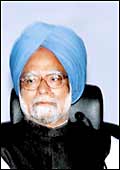 Another
of prime minister Manmohan Singh's pet projects, this one has
Rs 1,74,000 crore to spend on creating infrastructure, and will
start burning the money this year. It hopes to bring electricity,
roads, safe drinking water and rural telephony to most villages
in the country by 2009. Take off it will, but an assessment of
its impact will have to wait. Another
of prime minister Manmohan Singh's pet projects, this one has
Rs 1,74,000 crore to spend on creating infrastructure, and will
start burning the money this year. It hopes to bring electricity,
roads, safe drinking water and rural telephony to most villages
in the country by 2009. Take off it will, but an assessment of
its impact will have to wait.
-Ashish Gupta
J: JOBS
Will India create enough?
Not really. The unemployment
rate will continue to hover around 9.2 per cent this year too.
However, there will be a shortage of trained manpower in certain
industries such as it and it enabled services, organised retail,
financial services, and telecommunications. And salaries across
sectors will increase by close to 15 per cent.
-Kumarkaushalam
 L:
LAWYERS L:
LAWYERS
Will foreign law firms enter India?
Unlikely. India is bound by
the WTO general agreement on Trade in Services to open up legal
services, but the Ministry of Law and Justice has recently issued
a statement ruling out the entry of foreign law firms. And the
all-powerful bar Council of India is against the move too.
-Sahad P.V.
H: HEADHUNTERS
Will their lot increase?
Definitely. Every one of the
world's top 10 executive search (that's the term of choice within
the industry) firms is in the country, and Indian companies are
increasingly turning to them to find people. The new trend of
a one-year guarantee, which binds the search firm to find a replacement
if a candidate is unsuitable, is a healthy one.
-Amanpreet Singh
I: INDEPENDENT
DIRECTORS
Will companies be able to meet the requirements
of Clause 49?
The December 31, 2005 deadline
for companies to ensure that 50 per cent of their board is composed
of independent directors has come and gone. Companies are still
hoping that the amendment to the Companies Act, waiting to be
passed by Parliament, will reduce the proportion to 33 per cent.
Either way, the 9,000 listed companies in the country will need
30,000 independent directors. Where will they find them?
-Krishna Gopalan
K: KOLKATA
Can Buddha make the city a center of industry
again?
 He
could. The city's infrastructure has improved, as has its perception
among potential investors. However, the dichotomy between the
communist ideology in the state (where Chief Minister Buddhadeb
Bhattacharjee calls the shots) and that at the Centre, where Politburo
chief Prakash Karat does so, could worsen this year and derail
his attempts to do so. He
could. The city's infrastructure has improved, as has its perception
among potential investors. However, the dichotomy between the
communist ideology in the state (where Chief Minister Buddhadeb
Bhattacharjee calls the shots) and that at the Centre, where Politburo
chief Prakash Karat does so, could worsen this year and derail
his attempts to do so.
-Ritwik Mukherjee
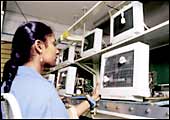 M:
MANUFACTURING M:
MANUFACTURING
Will India become a hardware hub?
Yes. But only if it gets its
act (in terms of infrastructure, most importantly) right, and
experiments such as the chip fabrication plant being put up by
Sem-India succeed. The country already boasts some of the required
ingredients, such as a growing domestic market, and a highly educated
workforce.
-Venkatesha Babu
P: PHARMA
Will the year be a better one for Pharma?
 Yes.
Pharma biggies such as Dr Reddy's laboratories and Ranbaxy Laboratories
are armed with a stronger pipeline for generics, drugs that are
going off patents. The latter proposes to launch 15 products in
the year, with at least two of them promising to bring in $300
million a year in sales. Yes.
Pharma biggies such as Dr Reddy's laboratories and Ranbaxy Laboratories
are armed with a stronger pipeline for generics, drugs that are
going off patents. The latter proposes to launch 15 products in
the year, with at least two of them promising to bring in $300
million a year in sales.
-Sahad P.V.
R: RETAIL
FDI finally?
Unlikely, although it remains
one of the top (articulated) priorities of the government of the
day. The communist parties, a key ally, are dead against the move.
-Ashish Gupta
N: NEW
NEW THING
Genetech, nanotech, or something else?
Well it will likely be one of
the two, and most probably the first. India's pharma companies,
and several hot start-ups are already exploring the frontiers
of genetech, the Holy Grail as far as lifesciences is concerned.
Nanotech promises much, and there are a few Indian companies working
in the area, but give them time.
-VB
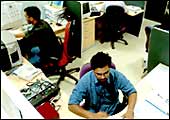 O:
OFFSHORING O:
OFFSHORING
Will India remain the preferred off-shoring
destination for IT and IT-enabled services?
Yes, but not for too long. It
produces enough engineers and graduates, and boasts a 50 per cent
cost advantage. However, it consulting firm Gartner predicts that
crumbling infrastructure, rising hr costs, and growing competition
from other destinations could erode India's share of the market
from 85 per cent today to 45 per cent in two years.
-Rahul Sachitanand
Q: QUALITY
Will India's obsession with the Deming Medal
continue?
Yes. Thus far, 13 Indian firms
have won Quality's Oscar with 3 doing so in 2005. At least four
or five companies will do so this year, and not all of them will
be from the automotive sector.
-Nitya Varadarajan
S: SENSEX
Which way will it go?
 The
sensex (leaving out oil and steel firms) is trading at a forward
price earnings multiple of 21-22, which is not cheap. As long
as foreign institutional investors continue to pump in money,
there shouldn't be cause for concern, but the upside will be limited
from now on. The
sensex (leaving out oil and steel firms) is trading at a forward
price earnings multiple of 21-22, which is not cheap. As long
as foreign institutional investors continue to pump in money,
there shouldn't be cause for concern, but the upside will be limited
from now on.
-Mahesh Nayak
T: TRADE
Will India move closer to becoming an export
powerhouse?
Not anytime soon, although its
exports will increase to around $145 billion (Rs 6,52,500 crore)
for the year 2005-06. With bilateralism (free trade agreements
with several countries) becoming the order of the day, and the
consequent lowering of tariffs, the country will be happy to increase
its share of world exports from 0.82 per cent now to 1.10 per
cent by 2010.
-Kumarkaushalam
V: VENTURE
FUNDING
Will VCs rush to fund Indian web 2.0 companies?
Well, most venture capitalists
have hitherto been content with playing the private equity game.
Web 2.0 companies are sprouting in Bangalore and Mumbai, but it
is unlikely that VCs will make a beeline for them. This year,
they'll probably focus on engineering and design backroom firms.
-S P.V.
 W:
WOMEN CEOS W:
WOMEN CEOS
Will we see more?
Not really. However, with more
companies buying into the concept of a diverse workplace, and
consciously working to remove glass ceilings, several women will
enter the ranks of senior management. Next year, maybe.
-Amanpreet Singh
Y: YOUTH
Will an Indian Michael Dell arrive on the
scene?
 For
a long time, until he turned 40 last year, Dell was on top of
Fortune magazine's list of the 40 Richest Under 40. Today, conditions
in India are propitious enough to see the emergence of an Indian
Dell. After all, a third of the Indian population is under the
age of 25, the country is in the midst of an entrepreneurial boom,
and with the stock markets on a roll, billionaires are being created
by the minute (well, almost). For
a long time, until he turned 40 last year, Dell was on top of
Fortune magazine's list of the 40 Richest Under 40. Today, conditions
in India are propitious enough to see the emergence of an Indian
Dell. After all, a third of the Indian population is under the
age of 25, the country is in the midst of an entrepreneurial boom,
and with the stock markets on a roll, billionaires are being created
by the minute (well, almost).
-Venkatesha Babu
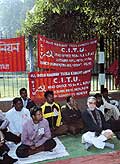 U:
UNIONS U:
UNIONS
Will trade unions become stronger?
They showed some muscle in 2005,
and will likely show some more this year. The communists, after
all, are key allies of the ruling United Progressive Alliance
government. Their next target: it and it enabled services firm.
-Sahad P.V.
X: XXX
With Playboy here, will India turn liberal?
 In
your dreams. Even the magazine Playboy will launch in the country
will be sans nudes and the name. Porn is still a big no for the
government. In
your dreams. Even the magazine Playboy will launch in the country
will be sans nudes and the name. Porn is still a big no for the
government.
-Ashish Gupta
Z: ZEITGEIST
Last year was for the investor; who will this
year be for?
For the indian multinational,
that's who. It isn't just the software biggies that are acquiring
firms overseas. Even old-world companies such as Bharat Forge
and Tata Steel are doing the same.
-Arnab Mitra
|




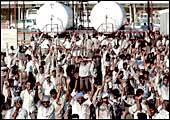



 Rs
1,374
Rs
1,374
 CLOSED:
CLOSED:
 ISSUED:
ISSUED:

 A:
AUTOMOBILES
A:
AUTOMOBILES
 E:
ENERGY
E:
ENERGY  Another
of prime minister Manmohan Singh's pet projects, this one has
Rs 1,74,000 crore to spend on creating infrastructure, and will
start burning the money this year. It hopes to bring electricity,
roads, safe drinking water and rural telephony to most villages
in the country by 2009. Take off it will, but an assessment of
its impact will have to wait.
Another
of prime minister Manmohan Singh's pet projects, this one has
Rs 1,74,000 crore to spend on creating infrastructure, and will
start burning the money this year. It hopes to bring electricity,
roads, safe drinking water and rural telephony to most villages
in the country by 2009. Take off it will, but an assessment of
its impact will have to wait. L:
LAWYERS
L:
LAWYERS He
could. The city's infrastructure has improved, as has its perception
among potential investors. However, the dichotomy between the
communist ideology in the state (where Chief Minister Buddhadeb
Bhattacharjee calls the shots) and that at the Centre, where Politburo
chief Prakash Karat does so, could worsen this year and derail
his attempts to do so.
He
could. The city's infrastructure has improved, as has its perception
among potential investors. However, the dichotomy between the
communist ideology in the state (where Chief Minister Buddhadeb
Bhattacharjee calls the shots) and that at the Centre, where Politburo
chief Prakash Karat does so, could worsen this year and derail
his attempts to do so. M:
MANUFACTURING
M:
MANUFACTURING Yes.
Pharma biggies such as Dr Reddy's laboratories and Ranbaxy Laboratories
are armed with a stronger pipeline for generics, drugs that are
going off patents. The latter proposes to launch 15 products in
the year, with at least two of them promising to bring in $300
million a year in sales.
Yes.
Pharma biggies such as Dr Reddy's laboratories and Ranbaxy Laboratories
are armed with a stronger pipeline for generics, drugs that are
going off patents. The latter proposes to launch 15 products in
the year, with at least two of them promising to bring in $300
million a year in sales. O:
OFFSHORING
O:
OFFSHORING  The
sensex (leaving out oil and steel firms) is trading at a forward
price earnings multiple of 21-22, which is not cheap. As long
as foreign institutional investors continue to pump in money,
there shouldn't be cause for concern, but the upside will be limited
from now on.
The
sensex (leaving out oil and steel firms) is trading at a forward
price earnings multiple of 21-22, which is not cheap. As long
as foreign institutional investors continue to pump in money,
there shouldn't be cause for concern, but the upside will be limited
from now on. W:
WOMEN CEOS
W:
WOMEN CEOS For
a long time, until he turned 40 last year, Dell was on top of
Fortune magazine's list of the 40 Richest Under 40. Today, conditions
in India are propitious enough to see the emergence of an Indian
Dell. After all, a third of the Indian population is under the
age of 25, the country is in the midst of an entrepreneurial boom,
and with the stock markets on a roll, billionaires are being created
by the minute (well, almost).
For
a long time, until he turned 40 last year, Dell was on top of
Fortune magazine's list of the 40 Richest Under 40. Today, conditions
in India are propitious enough to see the emergence of an Indian
Dell. After all, a third of the Indian population is under the
age of 25, the country is in the midst of an entrepreneurial boom,
and with the stock markets on a roll, billionaires are being created
by the minute (well, almost). U:
UNIONS
U:
UNIONS  In
your dreams. Even the magazine Playboy will launch in the country
will be sans nudes and the name. Porn is still a big no for the
government.
In
your dreams. Even the magazine Playboy will launch in the country
will be sans nudes and the name. Porn is still a big no for the
government.